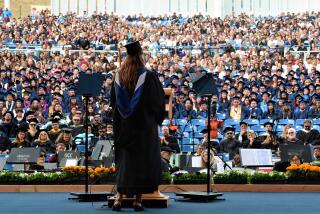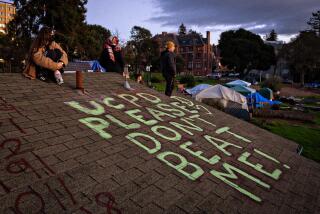Court Won’t Toss Out Suit Over College Barring Play
WASHINGTON — The Supreme Court refused today to kill a lawsuit against a California community college’s officials accused of unlawful censorship for blocking the on-campus performance of a racially charged play.
The court, without comment today, rejected an appeal by the college officials.
The case raised the question of whether college administrators have the same broad power as public high school officials to limit freedom of speech in school-sponsored activities.
The California dispute began in June, 1986, when Alan DiBona, a drama teacher at San Diego Community College, planned a class production of “Split Second.”
The play, written by Dennis McIntyre, is about a black New York City police officer who fatally shoots a white suspect after the suspect has taunted him with racial slurs and epithets. The officer, following his split-second loss of control, places a knife in the victim’s hand to make the shooting look like self-defense.
DiBona planned to have the play performed at the Educational Cultural Complex, a branch of the San Diego college. Students auditioning for parts in the play were to receive course credit.
Robert Matthews, president of the branch college, and James Hardison, dean of arts and sciences there, opposed the performance.
They said community church leaders who learned about the planned performance were upset. The college officials also expressed concern over profane language used in the play, saying it could inflame racial tensions already sparked by a local murder case in which a young black man was accused of shooting two police officers.
Hardison told DiBona to choose a play that was more uplifting. He suggested “The Wiz,” an adaptation of “The Wonderful Wizard of Oz” with an all-black cast.
When DiBona refused, the college canceled his class.
He and his students performed “Split Second” off campus. None of the students received course credit for the performance, and DiBona was not paid by the college.
DiBona and a student, Scott Gundlach, sued Matthews and Hardison for allegedly violating their free-speech rights.
A judge threw out the suit. But it was reinstated in July by a state appeals court, which ordered a trial.
The appeals court said, “A central premise of the constitutional guarantee of free speech is that difficult and sensitive political issues generally benefit from constructive dialogue of the sort which might have been generated by ‘Split Second.’ ”
The appeals court also drew a distinction between the censorship powers of college administrators and high school officials.
The appeals court noted that the Supreme Court in 1988 upheld the power of a high school principal to remove two controversial articles from a student newspaper. But college students are adults, the appeals court said, adding, “Where children are concerned, the legitimate role of the government in regulating speech is substantially broader.”
More to Read
Sign up for Essential California
The most important California stories and recommendations in your inbox every morning.
You may occasionally receive promotional content from the Los Angeles Times.










